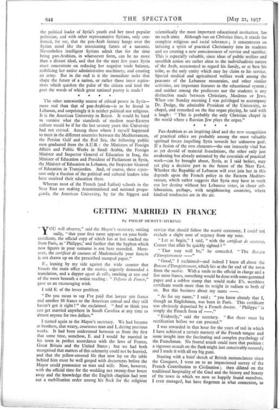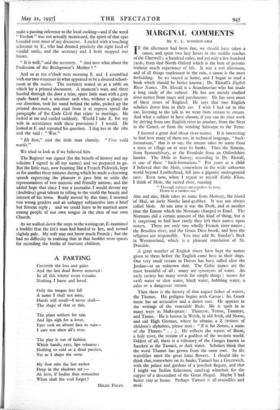GETTING MARRIED IN FRANCE
By PHILIP HEWITT-MYRIXG
" you will observe," said the Mayor's secretary, smiling sadly, " that your first name appears on your birth- certificate, the official copy of which has at last reached me from Paris, as ' Philippe,' and further that the hyphen which now figures in your surname is. not here recorded. More- over, the certificat de coutume of Mademoiselle your fiancée is not drawn up on the prescribed stamped paper."
E., leaning by my side against the wide counter that bisects the main office at the mairie, urgently demanded a translation, and a dapper agent de vile, smoking at one end of the room beneath a notice reading : " Defense de Fumer," gave us an encouraging wink.
I told E. of the lesser problem.
" Do you mean to say I've paid that lawyer soo francs and another 88 francs to the American consul and they still haven't got it right ! " she exclaimed. " And to think you can get married anywhere in South Carolina at any time to almost anyone for two dollars."
I turned again to the Mayor's secretary. We had become as brothers, that weary, courteous man and I, during previous weeks. It had been understood between us from the first that some time, somehow, E. and I would be married in his town in perfect accordance with the laws of France, Great Britain and the United States ; but we had both recognised that matters of this solemnity could not be hurried, and that the yellow-covered file that now lay on the table behind him must be well gorged with documents before the Mayor could pronounce us man and wife. Now, however, with the official time for the wedding not twenty-four hours away and the knowledge that the English chaplain had sent out a mobilisation order among his- flock for the religious service that should follow the mairie ceremony, I could not exclude a slight note of 'urgency from my tone.
" Let us begin," I said, " with the certificat de coutunze. Cannot that affair be quickly righted ? "
" That may well be," he conceded. " The Bureau d'Enregistrement —" " Good," I exclaimed—and indeed I knew all about the Bureau d'Enregistrement, which lies at the far end of the town from the mairie. With a smile to the official in charge and a few more francs, something would be done with some gummed paper and a rubber stamp that would make E's. worthless certificate worth more than its weight in radium to both of us. But this business about my nam.
" As for my name," I said ; " you know already that I, though an EnglishMan, was born in Paris. This certificate was obviously deposited by a French doctor. ' Philippe ' is simply the French form of —."
" Evidently," said the secretary. " But there must be rectification before we can proceed."
I was rewarded in that hour for the years of toil in which I have achieved a certain mastery of the French tongue and some insight into the fascinating and complex psychology of the Frenchman. No frontal attack could turn that position : a vigorous assault on the flank might just conceivably succeed ; and I made it with all my big guns.
Starting with a brief sketch of British nomenclature since the Conquest, I went on to an impassioned survey of the French Contribution to Civilisation ; then dilated on the traditional hospitality of the Gaul and the history and beauty of the town in which we now, so happily found ourselves. I even managed, but have forgotten in what connexion, to make a passing reference to the local cooking—and if the word " Verdun " was not actually mentioned, the spirit of that epic brooded over most of my discourse. I ended with a touching reference to E., who had donned precisely the right kind of wistful smile, and the secretary and I both mopped our brows.
" It is well," said the secretary. " And now what about the Profession of the Bridegroom's Mother ? "
And so at ten o'clock next morning E. and I assembled with our two witnesses in what appeared to be a disused school- room at the mairie. The secretary seated us at a table on which lay a printed document. A moment's wait, and there bustled through the door a trim, spare little man with a grey spade beard and a tricolour sash who, without a glance in our direction, took his stand behind the table, picked up the printed document, and read from it at express speed the paragraphs of the Code Civil that relate to marriage. He looked at me and smiled suddenly. Would I take E. for my wife in accordance with these provisimis ? I would. He looked at E. and repeated his question. I dug her in the ribs and she said : " Wee."
"Eh bien," said the little man chattily. " Vous voila manes."
We tried to look as if we believed him.
The Register was signed (for the benefit of history and my solicitor I signed in all my names) and we prepared to go. But the little man, now beaming like a French Pickwick, kept us for another three minutes during which he made a charming speech expressing the pleasure it gave him to unite the representatives of two majestic and friendly nations, and the added hope that since I was a journalist I would devote my (doubtless) great talents to telling to the world the beauty and interest of his town. Really moved by this time, I inserted two wrong genders and an unhappy subjunctive into a brief but fervent reply ; and we could leave to be married anew among people of our own tongue in the rites of our own Church.
As we walked down the steps to the waiting car, E. examined a booklet that the little man had handed to her, and turned slightly pale. My wife may not know much French ; but she had no difficulty in realising that in that booklet were spaces for recording the births of fourteen children.















































 Previous page
Previous page